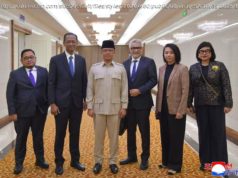Illustrating a split in their approach to the North, the two American allies differ on Seoul’s plan to provide humanitarian help through United Nations agencies.
SEOUL, South Korea — South Korea and Japan, the United States’ two main East Asian allies, differed on Friday over providing humanitarian aid to North Korea’s malnourished children and pregnant women, hours after that country launched a ballistic missile over Japan.
President Moon Jae-in of South Korea and the Japanese prime minister, Shinzo Abe, talked on the phone on Friday, sharing their condemnation of North Korea’s latest missile test and vowing to work together to bring about more sanctions against the country, Mr. Moon’s office said.
But Mr. Abe took issue with South Korea’s plan to donate $8 million to two United Nations humanitarian programs in North Korea. He asked Mr. Moon to reconsider the timing of the aid, Mr. Moon’s office said.
On Thursday, South Korea announced plans to donate $4.5 million to help the World Food Program provide nutrition-rich supplies to North Korean hospitals and day care centers. It also plans to donate $3.5 million to United Nations Children’s Fund projects that supply vaccines, medicine and malnutrition treatment to children and pregnant women.
Yoshihide Suga, Japan’s chief cabinet secretary, said on Thursday that providing aid for North Korea could undermine international efforts to pressure Pyongyang. But hours after the North’s missile launch on Friday, South Korea reconfirmed its humanitarian aid plans.
“We began considering humanitarian aid upon requests from the World Food Program and Unicef,” Mr. Moon was quoted in a statement from his office as saying to Mr. Abe. “In principle, giving support for infants and small children and pregnant women should be handled separately from politics.”
Relations between South Korea and Japan are often tense and include historical disputes rooted in Japan’s colonization of Korea. But under Washington’s urging, the countries have worked together to address the growing military threats from North Korea, and recently signed an agreement to share military intelligence.
Still, the approach of the new liberal South Korean leader differs from that of the conservative Japanese prime minister. When Mr. Moon took office in May, promising to push for dialogue with the North, his policy was feared to clash with Mr. Abe, who is widely considered a hawk on North Korea.
As North Korea accelerated its nuclear and missile programs with a spate of tests in recent months, Mr. Moon joined President Trump and Mr. Abe in advocating tougher sanctions. But he also insists that the crisis must be resolved through negotiations.
Mr. Trump has often cast doubt on Mr. Moon’s approach. On Aug. 30, he said that “talking is not the answer” in dealing with North Korea. Hours after the North conducted its sixth and most powerful nuclear test, on Sept. 3, he criticized South Korea’s “talk of appeasement with North Korea.”
Japan has been particularly alarmed by the last two missile tests because the projectiles flew over northern Japan before landing in the Pacific Ocean. The Japanese were told to take cover indoors or underground in case the missiles malfunctioned and crashed.
In response to the North’s latest nuclear test, the United Nations Security Council adopted a new sanctions resolution against North Korea on Tuesday, its ninth since the country’s first nuclear test in 2006. If enforced, it would deprive North Korea of 30 percent of its annual fuel imports. It also bans textile imports from North Korea, stripping the country of another source of hard currency. And United Nations member countries are required to stop hosting new workers from North Korea.
The latest sanctions would further isolate North Korea’s economy, making more vulnerable its malnourished classes, including children, nursing mothers and older people, said Lee Eugene, a spokeswoman for South Korea’s Ministry of Unification. South Korea plans to complete the timing and details of its humanitarian aid package next week.
“They are for providing cereals and vaccines for these vulnerable classes,” Ms. Lee said, referring to the United Nations aid programs. “I don’t think this violates the spirit of the United Nations.”
Such an attitude differs sharply from that of South Korea’s previous conservative governments, which drastically curtailed humanitarian aid for North Korea, accusing its government of squandering on nuclear weapons programs the resources it should spend on its impoverished people. But supporters of humanitarian aid say that United Nations’ and other penalties were hurting poor North Koreans more than the country’s leaders.
North Korea’s economy has improved under its leader, Kim Jong-un, but United Nations relief agencies have appealed annually for donations, reporting widespread malnourishment among children and nursing mothers. Amid tensions over North Korea’s nuclear and missile programs, international donors have become increasingly reluctant to chip in.






